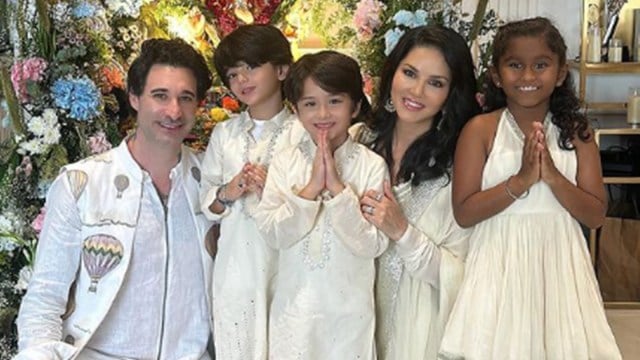📣 For more lifestyle news, click here to join our WhatsApp Channel and also follow us on Instagram
‘We didn’t grow up in India where you can have many people helping you’: Sunny Leone shares approach to teaching responsibility to her kids
"Daniel also takes on those roles where the kids do see him doing things," Sunny Leone added
 Sunny Leone encourages her kids to take care of their belongings without relying on extra help (Source: Instagram/
Sunny Leone encourages her kids to take care of their belongings without relying on extra help (Source: Instagram/Actor Sunny Leone, known for balancing her career and family life, recently shared her approach to instilling responsibility in her young children.
In an interview with Hauterrfly, she says that she encourages her kids to take care of their belongings without relying on extra help, explaining how her husband, Daniel Weber, takes up household chores as well, “We didn’t grow up here in India where you can have many people helping you. We grew up in a household where we had to clean our own room and help out the household and do dishes, and do your laundry, and take care of your own house.”
This helps the kids understand that everyone is responsible for their own belongings. “I think Daniel also takes on those roles where the kids do see him doing things. We went on vacation recently for two weeks, and we didn’t have any extra help with us. It was just us and our children. So they had to take care of their clothes, they had to put their shoes away, they had to put everything into the laundry bag, take care of their own things.”
View this post on Instagram
By assigning these tasks, Leone aims to build independence and help her children learn the value of responsibility from an early age. As parents look for ways to foster similar independence in their own children, understanding age-appropriate tasks and learning how to encourage children to participate in household duties can be invaluable.
Neha Cadabam, senior child psychologist at Cadabams Child Development Centre, tells indianexpress.com, “Assigning household tasks to children not only keeps them engaged but also builds life skills, independence, and a sense of responsibility.”
Age-appropriate household tasks that can help children develop independence and responsibility
Here’s a breakdown by age group, as mentioned by Cadabam:
Toddlers (2-3 years): Simple tasks like putting toys in a bin, placing shoes on a designated rack, or helping feed pets are appropriate. At this stage, tasks should be quick and straightforward, focusing on routines rather than perfect outcomes.
Preschoolers (4-5 years): Preschoolers can take on tasks like making their bed, setting the table, sorting laundry by colour, and putting their dirty clothes in the laundry basket. These activities help them understand order and responsibility in an approachable way.
School-Age Children (6-10 years): At this age, children are ready for more complex tasks, such as dusting, folding laundry, emptying the dishwasher, and even preparing simple snacks. These tasks require a mix of coordination and routine, making them perfect for this stage of development.
Preteens (11-13 years): Preteens are ready for tasks that need a bit more responsibility, like cooking basic meals, vacuuming, taking out the trash, and organising their rooms. They can also manage their schoolwork station, keeping it tidy and stocked.
 Simple tasks like putting toys in a bin, placing shoes on a designated rack, or helping feed pets are appropriate for toddlers. (Source: Freepik)
Simple tasks like putting toys in a bin, placing shoes on a designated rack, or helping feed pets are appropriate for toddlers. (Source: Freepik)
How can parents introduce these tasks in a way that feels positive and empowering for kids?
Cadabam provides some steps parents can follow:
Frame tasks as privileges: Rather than saying, ‘You have to do this,’ try framing it as,’You’re old enough to handle this now,’ which gives a sense of achievement.
Demonstrate first: Show them how to do the task in a fun and engaging way. For instance, putting away clothes can become a fun game of ‘who can sort faster,’ encouraging involvement without pressure.
Use positive reinforcement: Praise and recognition, even for simple tasks, reinforce effort. ‘Great job putting away your toys! Look how neat your room looks!’ helps children feel proud of their work, which can motivate them to keep up the habit.
📣 For more lifestyle news, click here to join our WhatsApp Channel and also follow us on Instagram
Photos



- 01
- 02
- 03
- 04
- 05
























